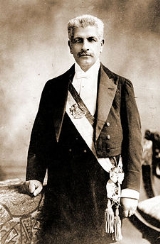
Pedro Montt
Encyclopedia
Pedro Elías Pablo Montt Montt (Santiago, Chile
, June 29, 1849 - August 16, 1910) was a Chile
an political figure. He served as the president of Chile
from 1906 to his death from a probable stroke
in 1910. His conservative government furthered railroad and manufacturing activities but ignored pressing social and labour problems.
and Rosario Montt Goyenechea, Pedro Montt graduated in law from the National Institute in 1870. He was elected a member of the Chamber of Deputies
in 1876 and became its president in 1885. Montt held two posts in the cabinet of President José Manuel Balmaceda
, but in 1891 he took an active part in the revolution that overthrew Balmaceda. He then went to the United States, first as an agent of the revolutionary junta and later (after U.S. recognition) as Minister.
Unsuccessful in his first bid for the presidency in 1901, Montt was elected by a large majority in 1906 as the candidate of the National Union ticket. His first action was to call out the army to suppress large-scale strikes in 1907. His administration supported the construction of a railway that ran the length of the country and stimulated the production of nitrates and copper
. It did little, however, to improve the living conditions of the people. In 1909, then-child-prodigy pianist Claudio Arrau
played for Montt, who was so taken by the performance that he authorized a ten year grant from the Chilean government for Arrau to study in Europe. In 1910, Montt left Chile for medical treatment in Germany
, but died before he could return to Chile.
Santiago, Chile
Santiago , also known as Santiago de Chile, is the capital and largest city of Chile, and the center of its largest conurbation . It is located in the country's central valley, at an elevation of above mean sea level...
, June 29, 1849 - August 16, 1910) was a Chile
Chile
Chile ,officially the Republic of Chile , is a country in South America occupying a long, narrow coastal strip between the Andes mountains to the east and the Pacific Ocean to the west. It borders Peru to the north, Bolivia to the northeast, Argentina to the east, and the Drake Passage in the far...
an political figure. He served as the president of Chile
President of Chile
The President of the Republic of Chile is both the head of state and the head of government of the Republic of Chile. The President is responsible of the government and state administration...
from 1906 to his death from a probable stroke
Stroke
A stroke, previously known medically as a cerebrovascular accident , is the rapidly developing loss of brain function due to disturbance in the blood supply to the brain. This can be due to ischemia caused by blockage , or a hemorrhage...
in 1910. His conservative government furthered railroad and manufacturing activities but ignored pressing social and labour problems.
Biography
The son of the former Chilean president Manuel Montt TorresManuel Montt
Manuel Francisco Antonio Julián Montt Torres was a Chilean statesman and scholar. He was twice elected President of Chile between 1851 and 1861.-Biography:...
and Rosario Montt Goyenechea, Pedro Montt graduated in law from the National Institute in 1870. He was elected a member of the Chamber of Deputies
Chamber of Deputies
Chamber of deputies is the name given to a legislative body such as the lower house of a bicameral legislature, or can refer to a unicameral legislature.-Description:...
in 1876 and became its president in 1885. Montt held two posts in the cabinet of President José Manuel Balmaceda
José Manuel Balmaceda
José Manuel Emiliano Balmaceda Fernández was the 11th President of Chile from September 18, 1886 to August 29, 1891. Balmaceda was part of the Castilian-Basque aristocracy in Chile...
, but in 1891 he took an active part in the revolution that overthrew Balmaceda. He then went to the United States, first as an agent of the revolutionary junta and later (after U.S. recognition) as Minister.
Unsuccessful in his first bid for the presidency in 1901, Montt was elected by a large majority in 1906 as the candidate of the National Union ticket. His first action was to call out the army to suppress large-scale strikes in 1907. His administration supported the construction of a railway that ran the length of the country and stimulated the production of nitrates and copper
Copper
Copper is a chemical element with the symbol Cu and atomic number 29. It is a ductile metal with very high thermal and electrical conductivity. Pure copper is soft and malleable; an exposed surface has a reddish-orange tarnish...
. It did little, however, to improve the living conditions of the people. In 1909, then-child-prodigy pianist Claudio Arrau
Claudio Arrau
Claudio Arrau León was a Chilean pianist known for his interpretations of a vast repertoire spanning from the baroque to 20th-century composers, especially Beethoven, Schubert, Chopin, Schumann, Liszt, Brahms and Debussy...
played for Montt, who was so taken by the performance that he authorized a ten year grant from the Chilean government for Arrau to study in Europe. In 1910, Montt left Chile for medical treatment in Germany
Germany
Germany , officially the Federal Republic of Germany , is a federal parliamentary republic in Europe. The country consists of 16 states while the capital and largest city is Berlin. Germany covers an area of 357,021 km2 and has a largely temperate seasonal climate...
, but died before he could return to Chile.

